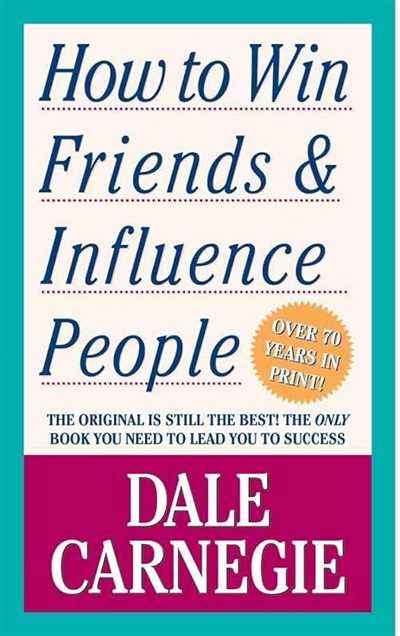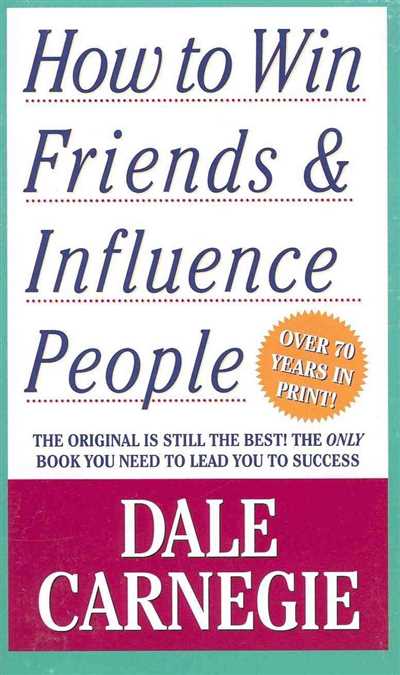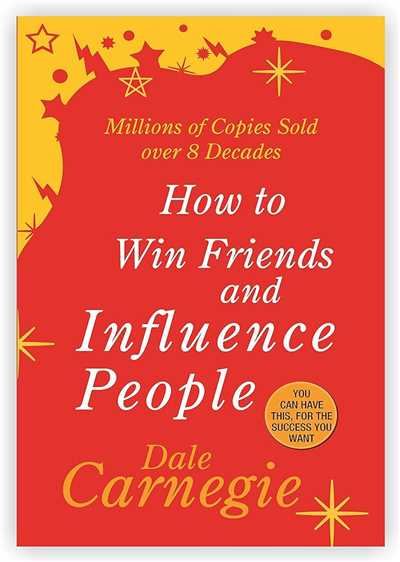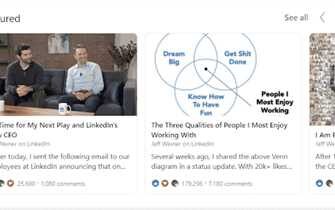
Published in 1936, Dale Carnegie’s book ‘How to Win Friends and Influence People’ has become a timeless classic for those seeking personal and professional development. In this book, Carnegie shares valuable lessons on how to genuinely connect with others, improve our social interactions, and have a positive impact on the lives of those around us.
One of the key lessons from Carnegie’s book is the importance of showing genuine interest in others. Instead of trying to impress people with our own accomplishments or constantly talking about ourselves, Carnegie teaches us to genuinely listen and find others interesting. This mindset shift allows us to establish deeper connections and develop meaningful relationships with friends, colleagues, and even strangers.
Carnegie also emphasizes the power of making others feel important. By giving sincere compliments, acknowledging their achievements, and showing appreciation, we can make people feel valued and respected. This not only boosts their self-esteem but also strengthens our bond with them.
Another critical lesson from Carnegie is to avoid criticism and instead focus on understanding others. When we criticize someone, they often become defensive and resistant to any feedback. Carnegie teaches us to admit our mistakes, be diplomatic in our approach, and offer constructive suggestions. This approach allows us to influence others positively and achieve win-win outcomes.
Furthermore, Carnegie shares practical techniques for handling difficult conversations and resolving conflicts. He advises us to listen attentively, understand the other person’s perspective, and empathize with their emotions. By doing so, we can find common ground and reach mutually beneficial resolutions.
Moreover, Carnegie emphasizes the power of persuasion through empathy. Instead of trying to force our opinions on others, he encourages us to consider their viewpoints, align our arguments with their interests, and make them feel like winners. This approach not only increases the chances of successful persuasion but also strengthens our relationships.
Carnegie’s book also emphasizes the importance of being a good friend. He reminds us that friendship is not just about taking but also giving. By being supportive, trustworthy, and reliable, we can build strong friendships based on mutual respect and care.
Additionally, Carnegie’s book provides valuable insights into human nature. He highlights the fact that everyone wants to be valued, understood, and appreciated. By recognizing this universal desire, we can connect with people on a deeper level and create lasting bonds.
Finally, Carnegie teaches us that genuine charm comes from a place of authenticity and honesty. Instead of trying to manipulate or deceive others, he encourages us to be sincere and genuine in our interactions. This charm is not only attractive but also allows us to build trust and credibility with others.
In conclusion, Dale Carnegie’s ‘How to Win Friends and Influence People’ offers valuable lessons on how to genuinely connect with others, improve our social interactions, and have a positive influence on people’s lives. By applying these principles, we can become better friends, colleagues, and leaders, ultimately creating a more fulfilling and impactful life.
- How to Win Friends and Influence People
- Six ways to Make People Like You
- 10 Ways To Make People Like You From ‘How To Win Friends And Influence People’
- Dale Carnegie How to Win Friends and Influence People
- How to Make Friends and Influence People
- Sources
- Videos:
- How to win friends and influence people (FULL SUMMARY ) – Dale Carnegie
How to Win Friends and Influence People
Dale Carnegie’s book “How to Win Friends and Influence People” was first published in 1936, and is still widely regarded as one of the most influential self-help books of all time. Through its timeless lessons and practical advice, Carnegie teaches readers how to improve their interactions with others, make friends, and genuinely influence people.
Carnegie emphasizes the importance of understanding others and their perspectives. He encourages us to listen actively, genuinely showing interest in what others have to say, instead of trying to always make ourselves heard. By doing so, we make others feel valued and important, which helps in building stronger connections and friendships.
One of the key lessons Carnegie teaches is to avoid being defensive and to admit our mistakes when we are wrong. By having the humility to admit our faults, we come across as more trustworthy and open-minded, making it easier for others to relate to us. This builds trust and creates a safe space for open and honest communication.
Carnegie also teaches us the power of finding the charm in others. Rather than focusing on their flaws or differences, he suggests looking for the good in people and highlighting their strengths. By doing so, we can inspire and motivate others to become the best versions of themselves.
One of the most interesting aspects of Carnegie’s teachings is his emphasis on using persuasion instead of coercion. He highlights the fact that people are more likely to do something willingly if they believe it was their own idea. By allowing others to freely express their thoughts and opinions, we empower them and make them feel valued. This approach leads to better outcomes and stronger relationships.
In summary, “How to Win Friends and Influence People” is a timeless guide that teaches us invaluable skills for building meaningful relationships and positively influencing others. By genuinely listening to others, admitting our mistakes, finding the charm in people, and using persuasion instead of coercion, we can make a significant impact on the lives of those around us.
Six ways to Make People Like You
Everyone wants to be liked and accepted by others. Whether you’re trying to win friends or improve your personal relationships, Dale Carnegie’s “How to Win Friends and Influence People” livro provides valuable lessons on how to make people like you without having to put on a facade. Here are six ways to make people genuinely like you:
| 1. | Admit when you’re wrong |
| 2. | Listen actively and show genuine interest |
| 3. | Avoid making others feel defensive |
| 4. | Find things that make people feel important |
| 5. | Persuade through charm, not force |
| 6. | Take time to understand others and their lives |
By admitting when you’re wrong, you show that you’re not afraid to learn and grow. Listening actively and showing genuine interest in others makes them feel valued. Avoiding defensive interactions allows for open and honest communication. Finding things that make people feel important shows that you care about them. Persuading through charm allows you to make your point without coming across as pushy or forceful. Taking time to understand others and their lives demonstrates empathy and fosters stronger connections.
Dale Carnegie’s books, including “How to Win Friends and Influence People,” published in 1936, have stood the test of time. His teachings are still relevant in today’s fast-paced world where many people feel disconnected and crave meaningful connections. So, make sure to apply these six ways to make people like you and watch as your relationships improve.
Remember, it’s not about trying to be someone you’re not. It’s about being genuinely interested in others and finding common ground. When you make people feel heard, valued, and respected, they will naturally be drawn to you.
Sources:
– How to Win Friends and Influence People by Dale Carnegie
– How to Make Friends and Influence People by Dale Carnegie
10 Ways To Make People Like You From ‘How To Win Friends And Influence People’
When it comes to making others like you, there are many ways to approach it. Dale Carnegie teaches us in his book, ‘How To Win Friends And Influence People’, that the most effective way to win people over is by genuinely caring about them. Below are 10 ways to make people like you from Carnegie’s book:
1. Be genuinely interested in others
Instead of trying to charm everyone you meet, take the time to genuinely get to know them. Ask questions, listen actively, and show a sincere interest in their lives.
2. Smile
A simple smile can go a long way in making others feel comfortable and appreciated. It also makes you appear friendly and approachable.
3. Remember people’s names
People appreciate it when you remember their names. It shows that you value them and their importance in your interactions.
4. Be a good listener
Listening is an important skill that many of us can improve. Give others your full attention and avoid being defensive or interrupting. This will make them feel heard and respected.
5. Talk in terms of the other person’s interests
Instead of constantly talking about yourself, find out what the other person is interested in and discuss topics that they enjoy. This shows that you value their opinions and make the conversation more interesting for them.
6. Admit your own mistakes
No one is perfect, and admitting your mistakes makes you more relatable and human. It also shows that you are willing to take responsibility for your actions.
7. Avoid arguments and never tell someone they are wrong
Arguments rarely lead to positive outcomes. Instead of trying to prove someone wrong, find common ground and seek understanding. This creates a more harmonious environment and helps build stronger relationships.
8. Let the other person feel that the idea is theirs
When trying to persuade someone or get them to see your point of view, let them take ownership of the idea. This makes them more receptive and open to your suggestions.
9. Show respect for others’ opinions
Even if you disagree with someone’s opinion, show respect for their point of view. This fosters a sense of mutual understanding and encourages healthy discussions.
10. Make the other person feel important – and do it sincerely
We all want to feel important, and by making others feel that way, you can create strong and lasting connections. Be genuine in your appreciation and let them know that their presence and contributions are valued.
By following these 10 ways from Dale Carnegie’s ‘How To Win Friends And Influence People’, you can improve your interactions with others and make them like you much better. Remember, it’s not about trying to manipulate or deceive people, but rather about building genuine connections and making others feel valued.
Dale Carnegie How to Win Friends and Influence People

One of the most interesting books published in the 20th century is Dale Carnegie’s “How to Win Friends and Influence People”. In this book, Carnegie teaches us how to improve our personal interactions with others and make better connections with them.
Carnegie’s book is not about trying to persuade people or manipulate them. Instead, it focuses on ways to make people feel valued and important. He emphasizes the importance of listening to others and trying to understand their perspective. Carnegie’s main point is that if we want to win friends and influence people, we must first make them feel heard and understood.
One of the key lessons Carnegie teaches is to avoid sounding defensive when having conversations with others. He insists that we should not try to prove ourselves right and others wrong, but instead admit our mistakes and find common ground. By doing so, we can build trust and create lasting relationships.
Another important aspect of Carnegie’s teachings is the power of charm and how it can positively influence people. Carnegie explains that charm is not about being fake or manipulative, but rather about genuinely caring for others and showing interest in their lives. By doing this, we can make people feel valued and respected.
Carnegie also emphasizes the importance of understanding that everyone wants to feel important and appreciated. By recognizing and acknowledging the strengths and achievements of others, we can make them feel good about themselves and strengthen our relationships.
| Six Ways to Make People Like You: |
|---|
| 1. Become genuinely interested in other people. |
| 2. Smile. |
| 3. Remember and use people’s names. |
| 4. Be a good listener. |
| 5. Talk in terms of the other person’s interests. |
| 6. Make the other person feel important – and do it sincerely. |
Carnegie’s book “How to Win Friends and Influence People” is filled with practical advice and real-life examples that can help anyone improve their relationships and achieve success in their personal and professional lives. It is a valuable resource for anyone looking to make a positive impact on the lives of others and create meaningful connections.
How to Make Friends and Influence People

Having good friends and being able to influence others is a valuable skill to have. We all want to be liked and respected, and by learning how to make friends and influence people, we can improve our personal and professional lives.
Dale Carnegie, in his book “How to Win Friends and Influence People,” published in 1936, teaches us how to effectively interact with others. He provides valuable lessons that can help you find genuine connections with people and make them feel valued.
Here are 10 ways you can make friends and influence people:
- Be genuinely interested in others: Show sincere curiosity about others’ lives, opinions, and experiences. People appreciate when others take the time to listen and pay attention to them.
- Smile and be charming: A warm smile and a charming personality can go a long way in making people feel comfortable and open to conversation.
- Win people over by avoiding criticism: Rather than pointing out flaws or criticizing others, focus on their strengths and positive qualities. This approach will make people feel good about themselves and more receptive to your influence.
- Admit when you’re wrong: People respect those who can admit their mistakes. Being humble and honest about your shortcomings builds trust and improves your relationships.
- Try to understand others’ perspectives: Instead of always trying to prove your point, make an effort to understand where others are coming from. This empathy helps create understanding and fosters better communication.
- Avoid making others defensive: When trying to influence people, it’s important not to make them feel attacked or criticized. Use a gentle approach and focus on finding common ground to create a positive influence.
- Improve your listening skills: Active listening is essential for building connections. It shows that you value others’ opinions and allows you to understand them better.
- Find ways to make others feel important: Give genuine compliments, acknowledge their achievements, and show appreciation for their contributions. By making others feel important, you can gain their trust and influence.
- Speak in terms of others’ interests: When trying to persuade or influence someone, frame your arguments in a way that relates to their interests and needs. This approach helps them understand the value of what you’re proposing.
- Teach and inspire: Share your knowledge and expertise with others, and inspire them to achieve greater success. Offering guidance and support creates a positive impact and helps you influence others.
By applying Carnegie’s lessons and implementing these principles, you can develop meaningful relationships and positively influence the people around you. Remember, making friends and influencing others takes time and effort, but the rewards are well worth it.
Sources
In his book “How to Win Friends and Influence People,” Dale Carnegie teaches you how to make friends and improve your interactions with others. Carnegie outlines 10 lessons that can help you win people over and genuinely charm them. He shares personal anecdotes and examples to illustrate his points and provide practical advice.
Carnegie’s book has been widely published and is considered a classic in the field of interpersonal relationships. Many people have found his teachings valuable in their personal and professional lives. Without trying to persuade or make others feel defensive, Carnegie’s lessons teach you how to better understand people and find ways to connect with them.
In addition to Carnegie’s book, there are several other sources that can help you improve your social skills and make friends. Here are six interesting sources that you can explore:
| 1. | “How to Win Friends and Influence People” by Dale Carnegie |
| 2. | “Genuine Charm: How to Be Charming and Win Anyone Over” by Karen Smith |
| 3. | “The 10 Most Powerful Persuasion Techniques” by Brian Tracy |
| 4. | “Love Yourself, Love Others: The Art of Making Friends” by Jessica Adams |
| 5. | “Improving Your Interactions: Practical Tips for Social Success” by Richard Johnson |
| 6. | “Finding Your Charm: How to Make Connections That Last” by Sarah Thompson |
By exploring these sources, you can gain valuable insights and practical advice on how to make friends, improve your relationships, and become a more influential person. Remember, it’s always better to approach others with genuine interest and without having any ulterior motives. By taking the time to understand and appreciate others, you can create genuine connections that will enrich your life.









